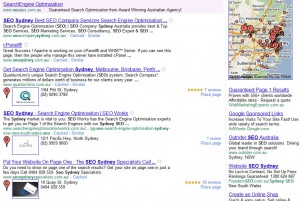 We thought we would get in early and predict the coming trends for SEO in 2011.
We thought we would get in early and predict the coming trends for SEO in 2011.
1. Increased Focus on Local Search (Google Places)
Google has already shown its intention to increase the importance of local search. Some keywords have already started showing a combined local and normal search, as you can see in the image here.
 |
It seems that businesses will be hampered in optimising for a location, when you don’t have a Google Places listing in that area. This means good things for local businesses that have a reputation, and bad things for international businesses that don’t have local HQ. It also places a greater emphasis on local reviews, as they are now listed alongside your normal web listing.
What can businesses do? Well for starters every business should claim their Google Places listing. Next you should try to get listed in every local web directory you possibly can. For more information you can read our post on Google places.
So what could Google do next? Google has removed the use of external reviews from their local search but in the next year businesses will be able to have their own testimonials from their website appear on their Google places listing. This indicates that Google intends to make Google Places to keystone of their move forwards for search.
2. Different optimisation for mobile search
Right now if you do a search on a mobile device, unless you specify otherwise, you will get the same results as a normal browser search. There is already some changes to the way search is presented, but not really enough to notice a difference. This has to change to increase the focus on websites that are correctly optimised for mobile browsing.
Mobile browsing currently makes up around 5% of all web browsing, however we already know that those browsers are tech-savvy, heavily connected, early adopters. This means that by the end of next year, we expect, mobile browsing will make up as much as 15% of all web browsing.
As mobile browsers have different requirements (screen size, media use etc) to desktop browsers, there will have to be a change in the way Google evaluates websites to give properly mobile optimised websites preference over those that are not. In the same way that Google is increasing the value of fast websites, so too will they increase the value to websites that are optimised for mobile browsing.
3. Increase in link value for “in context”
At the moment, most web masters know that links that are out of context (ie links that have nothing to do with the page content) get less value than those that are in context. What we expect to see over the next year is an increase in the value of in context links. We are not going to speculate on the current value of things like blog comments and forum posts, but we expect these to reduce in value over the coming months. Why? Well it is a small chink in the search algorithm that spammers go for. At the moment an SEO spammer can forum post, blog spam, mass three way link exchange, and even though there is diminishing returns, these links still count, and against pages that are old but have no links, they do quite well.
Overall what we expect to see in the next few Google updates is a reduction in value for links from spam havens like Digital Point forums, and an increase in the value of links from quality pages/posts, EVEN if they are rel=”nofollow”. There may even be a balance between high and low quality links, with a penalty for a high number of low context/quality links.
This expectation is reinforced by the face that EVERYONE is saying the only way to build links is with websites that are in the same field as you.
4. Rise of Yahoo/Bing
 |
This is highly speculative given Google’s long term dominance, and that in 10 years of web growth both Microsoft and Yahoo have done nothing to crack the market. However it would take a further massive failure on the part of Microsoft for them to no steal at least some of the search traffic from Google. Right now they make up about 5% of the traffic to this website, but they make up about 10% of the total web search traffic. We think this has every chance of rising to 20% by the end of 2011.
Ever since Bing started to provide the search results for Yahoo (effectively turning Yahoo away from being a search provider and into a content provider), they pretty much became the only other English language search contender to Google.
A lot of web users have forgotten about other search engines, which means they only need to become reacquainted to start using another search engine. There are a lot of instances where Google’s first page results have become filled with content that is not relevant or is getting a little spammy. It will only take a few of those for a user to start looking for something else.
Yahoo/Bing will need to work on some partnerships with browsers and content providers to become a serious alternative however, but they have all the potential to grab more of the search market.
5. Social Media Integration
In the same way that Google has integrated customer ratings and local places into search, we expect that Google will combine information from popular social networks link Facebook into the normal search results. At the moment you can see results from Twitter, but there is little to no connection between the social result and the normal search result.
As media like Twitter becomes more popular, we expect to see Google integrate feeds from social websites into their normal search. We don’t think it will affect the results in any way, ie you wont be able to spam Twitter to improve your normal search place. However we do think there will be some reference to social media activity within your listing. You Facebook/Twitter page may well become like your physical address in Google Places, who knows.
6. Website Speed
I wasn’t going to include website speed as a trend, because it is sort of already happening, but I have decided to throw this in here at the last minute. Google has already shown that it is taking the speed of a website into consideration as a ranking factor, but also stated that a slim percentage of website will be affected. It is fairly easy to see that Google will continue to make website speed an increasingly important factor in assessing the quality of the user experience.
Do you have any coming trends for 2011?
Looking at the current scenario social networking in a broad business sense is definitely best and most effective way of drawing potential clients and interest to site. Playing its role in SEO process for any website, it can increase the number of meaningful hits to website. Using this form of social marketing is more effective because it draws customers in a more ethical way. Website promotion through social networking is more like a fun and one won’t have to wait for the result for weeks or months.